Humanoid Cylon
More actions
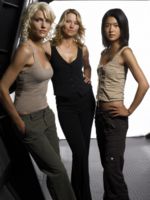
Cylon agents are Cylons that mimic human form so completely that they are nearly undetectable to current Colonial technologies. Cylon agents can either be actively aware of their origins as Cylons or can be programmed to believe that they are truly human, resulting in a "sleeper agent". These types of Cylons were responsible for aiding in the complete destruction of the Twelve Colonies through their use of sabotage and infiltration.
Origins
Following the end of the Cylon War, the Cylons withdrew from Colonial space to a planet of their own. For some 40 years, nothing was heard of them, and no apparent attempt was made by the Colonials to keep an eye on them. The only contact expected between the two was created by the Colonial government through planned annual diplomatic meetings at Armistice Station. However, while the Colonials sent a repesentative to the station every year, the Cylons did not (Miniseries).
During their forty years of isolation, the Cylons developed or evolved a humanoid form[1] that is indistinguishable with the human form, down to the cellular level, but not completely at a molecular level. These Cylon agents[2] have the capacity to emulate many human physical acts, including sex, as demonstrated by the Number Six and Sharon Valerii models. Cylon agents also display convincingly human personalities (affection, jealousy, sadness, anger, sense of humor etc.) In fact, they do so even when interacting with other Cylons outside of Colonial scrutiny, making it clear that these personalities are real. The majority of the Cylons follow a monotheistic religion (with the possible exception of the Brother Cavil model).
Cylon agents can be programmed to believe that they are truly human. These are known as 'sleeper agents'. Sleeper agents appear to have a low-level Cylon personality that can conduct operations while placing the human sleeper personality "on-hold." The first copy of Sharon Valerii, known by her callsign of "Boomer" on battlestar Galactica, had little awareness of her true nature until her arrest for the attempted assassination of William Adama (Kobol's Last Gleaming, Part II). This sleeper agent conducts or aids in sabotage operations within the Fleet (Water, Litmus). Most agent copies, particularly Numbers Five and Six, imitate human behavior, but are fully aware of their true nature and behave more or less like a human "spy."
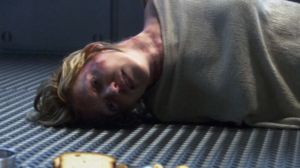
Agents are also susceptible to the same emotional traumas and clevages that their human counterparts are, further proving that personalities are a realistic part of their psyche, despite the presence of the Cylon portion of their personality. A case in point is a copy of Number Six, known as Gina, who was repeatedly physically and sexually assaulted by the crew of Pegasus. These repeated assaults lead to Gina's near-catatonic state at the time Peagsus discovered the Fleet (Pegasus).
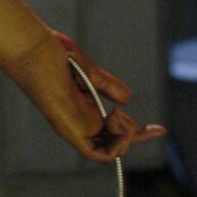
Although they cannot do so remotely or wirelessly, Cylon agents can interface with a computer system or computer network through subdermal physical contact with input cables connected to the devices. In "Flight of the Phoenix," Caprica-Valerii connected to Galactica's computers by this method when she inserted a fiber-optic cable through her left palm and into her arm. This subdermal fiber-optical link suggests that certain tissues in a Cylon agent are photo-reactive. The process involves cutting an opening into the agent's palm and appears painful, so it may not be a common method of data access.
A Cylon agent's brain is certainly human in appearance, but is apparently still susceptible to damage from certain types of radiation. Upon the death of an agent's body, a Cylon agent transfers its consciousness into another copy of itself. This ability is limited by distance, signal integrity, and proximity to a resurrection node or, in space, a Resurrection Ship (Miniseries, "Flesh and Bone," "Resurrection Ship, Part II").
Based on Caprica Sharon Valerii's conversation with Kara Thrace in the episode, "The Farm," it appears that all Cylon agents may share a collective knowledgebase of data from other active or deactivated Cylon agents. (A collective knowledgebase works more like an internet chat forum, or even a wiki, which differs from the concept of the collective consciousness as seen in SF characters such as the Borg in Star Trek. Writers of the show have indicated this type of "hive mind" is not used with agents.)
Valerii spoke of a conversation between Thrace and the second captured Leoben Conoy copy in the Fleet. This information would only be known to that now-dead Leoben copy if sharing were not possible. Kara Thrace's call sign, Starbuck, was also a likely bit of information gleaned from the collective knowledgebase that Simon knew of the Viper pilot, although Thrace never told him of her call sign and used it to strike back at her abductors (The Farm). Also, during "Flight of the Phoenix," Caprica-Valerii asks Anastasia Dualla if she still carried her pocket knife, a fact which should have been known only to the Galactica copy. When under duress, "Boomer" Valerii is able to tell Gaius Baltar the number of remaining Cylon agent agents in the Fleet, information that would be impossible to gather without a collective knowledgebase to all agents (Resistance).
Some or all Cylon "female" models may have the capacity to bear children seeded by human males ("33," "Flesh and Bone," "The Hand of God", "Kobol's Last Gleaming, Part II"). The Cylons tested numerous methods of sexual reproduction, yet these failed due to a known flaw in the Cylon agent design. Cylon agents cannot reproduce with each other biologically, so in an attempt to subvert this deficiency, they try to interbreed with humans, creating hybrid offspring. "Farms" were apparently set up across all the occupied Colonies where survivors, specifically, young fertile women of child-bearing age, were rounded up, placed under heavy sedation and turned into "baby machines" through artificial insemination (Ron Moore said there are presumably also farms for male humans, plus in vitro experiment labs, etc.). However, this method has been unsuccessful thus far. Another drastically different approach is taken by attempting to conceive a child through a bond of love. It seems that Helo and Caprica-Sharon Valerii's love-child is the lone success story of the relatively short history of Cylon sexual reproduction (The Farm).
Known Cylon Agent Models
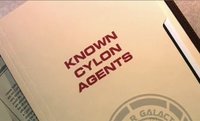
There are twelve models of Cylon agents (Miniseries), representing twelve archetypes the Cylons have witnessed in humanity. Thus far, seven models have been revealed to viewers as Cylon agents[3]. All Seven models are known to the Colonial Fleet as of the Occupation. Of each model there are many copies, probably tens or hundreds of thousands. Each Cylon agent has the same face, stature, hair, eye & skin color, gender, etc. as all the others of his or her model. The copies apparently start out with the same basic personality, but grow more distinct due to their individual experiences.
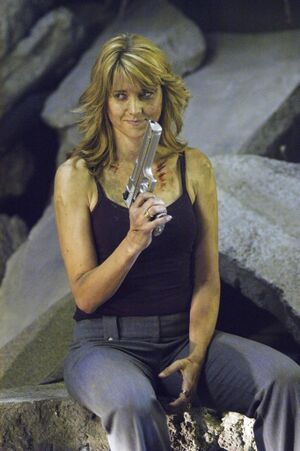
This model was witnessed by viewers posing as a reporter from the Fleet News Service and was revealed to be a Cylon at the end of "Final Cut" when a second copy was shown living on Caprica. Of all the Cylon agent models revealed to viewers, the Colonials are not yet aware that D'anna Biers is a Cylon agent as of the season two finale, "Lay Down Your Burdens, Part II". Three's seem to be the most calculating and two-faced models shown. The copy that tried to box Sharon Valerii exibited these chracteristics the most. Part of Biers' mission within Galactica's fleet (which fits her work as a journalist) likely involves the relay of important intelligence within the Fleet, such as the status of the pregnant Caprica copy of Sharon Valerii. This model's status as a Cylon is unknown to the Colonials until the rescue of the surviving members of the Caprica Resistance. It is reasonable to assume that the surviving Resistance members have since revealed this information.
A copy of this model has appeared under the name/alias "D'anna Biers."
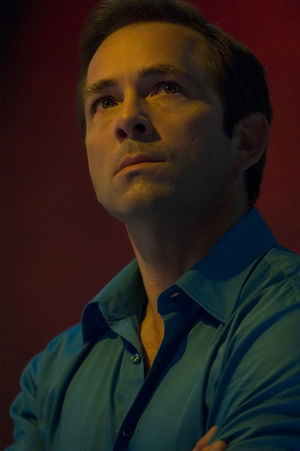
This model attempts to sow the seeds of discontent or confusion, particularly during crucial life-threatening situations, and endeavors to undermine authority that threatens his objectives (Miniseries). Doral models are more covert, assuming an ordinary "everyman" appearance that's blended in what may seem to be insignificant behind-the-scenes issues (such as converting Galactica into a museum). Of all the models thus far, the Aaron Doral models are the most militant, fanatic and consistent in message and objectives to the Cylon objectives, whether he is dispassionately discussing the fate of humanity with his comrades or attempting to kill or maim Colonials in a suicide bomb attack (Litmus). Viewers first meet Doral during a tour of Galactica with other Colonial citizens (possibly the press) as we see the battlestar for the first time at the start of the Miniseries. Viewers aren't sure of Doral's true identity as the second Cylon agent until the Miniseries' conclusion.
Copies of this model have appeared under the name/alias "Aaron Doral."
A copy of Number Five is seen with Caprica-Six and Sharon Valerii (Galactica copy) at the end of Season 2, and seems to be in command of the others. While Six and Sharon express concern and warning to Baltar and the New Capricans, Five expresses a tone of unmistakable threat.
A copy of Number Five (presumably the same entity seen at the end of Season 2) has Jammer detained, and is questioning him at the New Caprica Detention Center in Webisode 7. He shows classic tactics to try to buy the young refugee's trust, and eventually glean information from him about the resistance. He provides Jammer with an unknown Cylon device which will allow him to alert this Five in order to report further uprisings for the sake of peace.
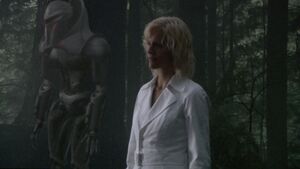
This is the first Cylon agent model shown to viewers at the start of the Miniseries.
This model utilizes the human need / desire for sexual relations to her advantage. She tends to be very religious and monotheistic. Model 6 desires to know what it is to be alive. There is something inherently enigmatic about her, more so than with the other models. Sixes have been described as "usually so hardcore", referring to their tendencies towards violence.
Typically she is the alpha female, as demonstrated on multiple occasions (Miniseries, 33, Water, Six Degrees of Separation).
Copies of this model have appeared under the names/aliases "Shelly Godfrey" , "Gina", and "Caprica" (in honor of her work on Caprica towards the destruction of the Colonies).
A virtual personality of Number Six haunts Gaius Baltar in a manner only he can see or hear. Throughout seasons one and two of the series, viewers presume this "virtual Six" was the "Caprica-Six" persona destroyed in the Miniseries. However, this persona appears not to be the same consciousness as Caprica-Six at all. Not only does Baltar's virtual Six appear to have a separate, destructive agenda from the reanimated Caprica-Six (containing the same personality template that infiltrates the Colonial military and falls in love with Baltar), but Caprica-Six is herself haunted by a virtual Gaius Baltar. See the Cylon-Related Hallucinations article for more on this confusing, but intriguing turn of events.
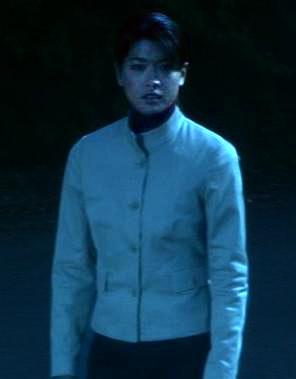
Number Eight is generally a saboteur designed to infiltrate Colonial military units and is likely programmed to use any Colonial munitions to cause havoc (Water). The Number Eight model is the closest witnessed Cylon agent model to show its abilities as a soldier. This model has shown naiveté in many matters. She is apparently not as religious as other Cylon models, but has demonstrated that she can love, and is capable of being impregnated by a human (Six Degrees of Separation, Kobol's Last Gleaming, Part II). She may be "defective", as the Cylon programming within the sleeper agent known as "Boomer" on Galactica conflicts multiple times with its human personality (Water). Also, the fully aware Sharon Valerii found by Helo on Caprica switches alliances from Cylon to Colonial after falling in love with Helo and aids the Colonials for a time (several episodes, most notably "Flight of the Phoenix"). Number Eight is the third Cylon agent introduced during the Miniseries. However, viewers do not discover her true identity until the very end of the Miniseries when a second copy of Sharon Valerii appears at Ragnar Anchorage while retrieving an abandoned copy of Number Five.
Copies of this model have appeared under the name "Sharon Valerii."
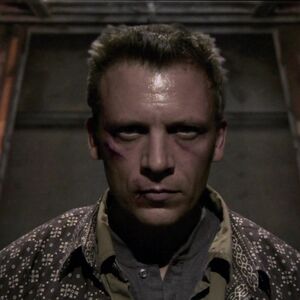
Leoben Conoy (Cylon agent model number unknown) was the fourth model witnessed by viewers (although viewers would not know until the end of the Miniseries that they had already seen the third introduced Cylon agent, Sharon Valerii). The Conoy model has shown to be religiously oriented and claims to be prescient on some level, using dogma and intermixing truth with falsehoods. It was first discovered on Ragnar Station, claiming to be a scavenger / arms dealer (Miniseries).
He can be likened to the serpent of the Genesis tale in the Earth Christian Bible, taunting people with knowledge then watching as the negative consequences come into devastating fruition. Leoben copies have likely been encountered by the Caprica Resistance, as Samuel Anders recites in jest some comments made by another Leoben copy captured in the Fleet (Flesh and Bone, The Farm).
The Simon model (Cylon agent model number unknown) was encountered by Kara "Starbuck" Thrace on Cylon-occupied Caprica. Posing as a doctor, Simon was actually involved with the Cylon hybridization program. Simon resembles a tall, somewhat thin middle-aged black man who speaks in a comforting strong voice (The Farm) Unlike other models, Simon doesn't seem to have many military aspects to his physical or mental configuration, and was easily overcome by a wounded Thrace. Simon may be a model based primarily on human intellectualism.
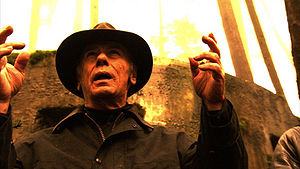
Brother Cavil (Cylon agent model number unknown) gives counsel to Chief Tyrol after his maddened attack against Cally. Despite his disdain in prayer and religous pomp and circumstance (Lay Down Your Burdens, Part I), Cavil conducts a prayer session with Laura Roslin, the latter apparently hoping that prayer would aid her success in the elections. Another copy of Cavil appears on Caprica, informing a Caprica Resistance SAR team that the Cylons had left the Colonies some 18 hours after Cylon units cease an attack on their unit. When the Caprica SAR team returns to Galactica, Tyrol recognizes and identifies Cavil as a Cylon agent. For a priest, and especially for a Cylon, Cavil displays an utter disdain for both the beliefs of the Colonial's Lords of Kobol and the Cylon God.
Caprica-Cavil alleges that he is sent to Galactica as a messenger of peace. He relays what occurred after Caprica-Six and Sharon Valerii (Galactica copy) are rescued from the wreckage of the cafe bombing (Downloaded). The two "Heroes of the Cylon" use their new found celebrity to voice what many in the Cylon population felt themselves... The Cylon annihilation of the human race and occupation of the Twelve Colonies was wrong. Caprica-Cavil tells Admiral Adama and President Roslin that the Cylons will go their own way, and leave the Fleet alone.
But Cavil's proclamation proves false a year later (Lay Down Your Burdens, Part II), due to the change in the Cylons' attitudes caused by Caprica-Six and Boomer, as the Cylons arrive to allegedly help the humans and live in peaceful coexistence with them ("Occupation", "Precipice").
Interestingly, the Fleet copy of Cavil claims, in conversation with Tyrol, that he had been preaching longer than Tyrol had been "sucking down oxygen" (Lay Down Your Burdens, Part I). If Cavil is being truthful and, assuming Tyrol is roughly thirty years old, Cavil has been operational for at least thirty years. This information conflicts with aired information that suggests that Cylon agent infiltration of the Colonies began approximately two years prior to the Miniseries. Based on this information, it is likely that Cavil's comment is part of his "cover" as an older Colonial citizen.
Hera/Isis
In deleted scenes from the episode "Downloaded", it is shown that Gaius Baltar attempts to steal the baby from Galactica in collusion with Gina and D'anna Biers. When Biers refers to the baby as Hera, Gina tells her not to call the baby by the name of a Human god, and to call her "Number Thirteen".
Speculated Infiltrators
- See the Cylon agent speculation article for analysis on characters and their likelihood of being a Cylon agent, based on episode information.
Ron Moore elaborates on the twelve models
In a 10/24/05 interview on "The Chase Show" on the SF webcast news site TheFandom.com with veteran "Star Trek: Deep Space Nine" actress Chase Masterson, Ron D. Moore is interviewed and directly answers two key questions in the Twelve Models debate and the origin of Sharon Valerii in particular. Here is a transcription of that interview segment.
- Chase: ... I just have to ask something... is there one Boomer that's just human?
- Ron: No, there's not. I mean, the idea is not there was one like an original human model that they were copied from. The idea was that these were... these models of Cylon were developed out of their own study of us. The Cylons on some level looked at humanity and said, "Well, you know what, there's really only twelve of you... and these are the twelve." And then if you look at them, they kind of represent different archetypes of what humanity is. Um, Sharon, in particular — Sharon-Boomer, went through quite a trans-metamorphosis because in the original Miniseries script, in the first draft, she wasn't a Cylon at all. She was going to be just — I wrote her just — I wanted a youngish pilot, who was the rookie, who was sort of vulnerable in ways, who made mistakes in ways that you're not used to seeing your heroes on TV shows do, and I was really interested in this idea of the officer, the female officer in love with the male deck chief in violation of all the rules and I kinda thought, going forward, that she and the chief, in combination with Boxey, who's really only in the Miniseries and one or two other episodes, would form sort of our family unit, that that was kind of a family...
- Chase: OK...
- Ron: ... and actually, after that first draft was written, it was David Eick, my producing partner, who said, "You know what, if at the end of this thing, at the very end when all the Cylons walk into Armistice — into the Ragnar station at the end... if you turn around and Sharon is one of the Cylons, he said, we're definitely gonna get picked up for a series.
- Chase: (laughs) OK... that did make... that really did seal the deal...
- Ron: ... and I just really went... that's a great idea and I realized that, because I'd had laid... I had written a story straight, I really hadn't cheated. There was no hint of who Sharon might be, and it really did suck you in, and really sort of, you believed her as a person first, and then we revealed her as a Cylon.
- Chase: ... Right....
- Ron: ... And so what happened after that was, I assumed going into the first season — well I didn't assume, I just planned... to slowly, over the course of the first year, peel back the layers — that Sharon would only start to sort of discover her Cylon nature by the end of the first year.
- Chase: Oh, God... and it was heartbreaking, watching that unfold, because I loved her much as human, and she was just adorable, with him and then with the kid, it was like, oh, what a great girl, she's um... you know, young and cute, and — who's the actress — and that whole thing, and then you're like, WHAT?
- Ron: Yeah...
- Chase: ... She's the enemy...
- Ron: I know then, she's the enemy, then she's the one that is your most worry, what's she gonna do next.
- Chase: Yeah. You really took us on quite a journey there. I was still hoping for a human one running around somewhere, but no, huh?....
- Ron: No.
- Chase: Oh, well...
With this information from the show's main creative leader, it is established as canon that:
- There are precisely twelve human Cylon models. The other varieties of Cylon spacecraft or fighters are not factored into this count of 12 models.
- None of the Cylon agents were ever an actual human.
- The twelve models are based on on archetypes determined by the Cylons that form what they perceive were the specific kinds of human behavior and/or personality, distilled into twelve varieties.
References
- ↑ The idea of Cylons in humanoid form is not new. This concept appeared over 25 years earlier in the episode "The Night the Cylons Landed" in the short-lived spinoff of the Original Series, Galactica 1980.
- ↑ Viewers initially lacked an authentic term to call the humanoid Cylons during season 1 of the series. Here on the Battlestar Wiki, the descriptive term "Humano-Cylon" was used for a time. Dialogue in several episodes throughout season 2 have consistently used "Cylon agent" to describe the humanoid Cylons. Other names are also used, such as "humanoid-Cylons" (which Tricia Helfer often uses in interviews, but apparently more for convenience than an official name), or "Bio-Cylons" which is sometimes used derisively by fans of the Original Series.
- Some of the resistance fighters on Caprica refer to the Cylon agents as "Skin Jobs," a script reference to Blade Runner.
- ↑ The term "Known Cylon agents" is shown on a dossier on the models shown on Laura Roslin's desk on Colonial One in the episode "Epiphanies."
